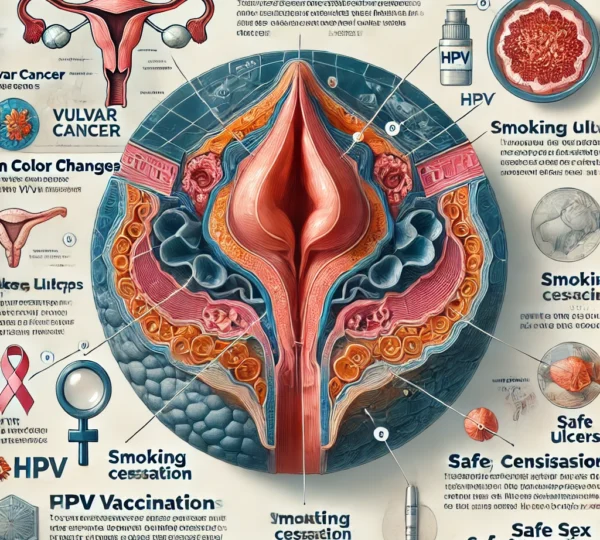Protect Your Vulvar Health: Understanding Vulvar Cancer Risks
Comprehensive Content on Vulvar Cancer
Introduction
Vulvar cancer is a rare type of cancer that affects the outer part of the female genital area, known as the vulva. Although it accounts for a small percentage of gynecological cancers, it is essential to raise awareness about its symptoms, causes, and prevention. Early diagnosis and timely treatment play a vital role in improving survival rates and overall outcomes.
Symptoms of Vulvar Cancer
Recognizing the symptoms of vulvar cancer early can lead to better treatment outcomes. While some symptoms may resemble those of other conditions, it’s important to consult a healthcare professional if any of the following occur:
- Changes in Vulvar Skin Color: Noticeable redness, darkened areas, or white patches on the vulva.
- Unusual Growths or Bumps: Small lumps, wart-like growths, or persistent ulcers that do not heal.
- Thickened Vulvar Skin: Skin that feels tougher or thicker than usual.
- Persistent Itching or Soreness: Ongoing discomfort that does not respond to common remedies.
- Open Sores on the Vulva: Lesions that are painful, bleeding, or slow to heal.
- Painful Urination: A burning sensation or discomfort while urinating.
- Abnormal Vaginal Bleeding or Discharge: Unexplained bleeding, especially between menstrual periods or after menopause.
Causes of Vulvar Cancer
The exact cause of vulvar cancer is not fully understood, but certain factors are known to increase the risk:
- Human Papillomavirus (HPV) Infection: A leading cause of many genital cancers, including vulvar cancer. HPV vaccination can significantly reduce this risk.
online pharmacy buy cialis professional no insurance with best prices today in the USA
- Smoking: Harmful chemicals in cigarettes damage vulvar tissues, increasing cancer risk.
- Radiation Exposure: Prolonged or repeated exposure to radiation can lead to mutations in vulvar cells.
- History of Vulvar Intraepithelial Neoplasia (VIN): A precancerous condition of the vulva that can progress to cancer if untreated.
- Weakened Immune System: Conditions like HIV or immunosuppressive therapies may make the vulva more vulnerable to cancer development.
Diagnosis and Treatment of Vulvar Cancer
Diagnosis
If symptoms suggest vulvar cancer, the following steps may be taken for a confirmed diagnosis:
- Physical Examination: A thorough inspection of the vulva for visible abnormalities.
- Biopsy: Removal of a small tissue sample from the affected area for microscopic analysis.
- Imaging Tests: MRI, CT, or PET scans to determine the extent of cancer spread.
Treatment
Treatment for vulvar cancer depends on the stage, size of the tumor, and overall health:
- Surgery: Includes options like excision of the tumor, vulvectomy (partial or complete removal of the vulva), or lymph node removal.
- Radiation Therapy: High-energy rays are used to destroy cancer cells and shrink tumors, often in conjunction with surgery.
- Chemotherapy: Medications to kill cancer cells, especially in advanced cases or when surgery isn’t possible.
Prevention Tips for Vulvar Cancer
Although vulvar cancer cannot be entirely prevented, certain measures can lower the risk significantly:
- Get Vaccinated Against HPV: Early vaccination against HPV is highly effective in preventing related cancers.
- Quit Smoking: Eliminating tobacco use reduces the risk of cancer and improves overall health.
- Practice Safe Sex: Reducing the number of sexual partners and using barrier methods like condoms can lower HPV transmission risk.
- Maintain Good Hygiene: Proper genital care and hygiene reduce irritation and infections.
- Regular Medical Checkups: Scheduling routine pelvic exams and pap smears helps in early detection of abnormalities.
Living with Vulvar Cancer
Receiving a vulvar cancer diagnosis can be overwhelming, but there are ways to manage both the physical and emotional aspects of the disease:
- Support Networks: Joining support groups can provide comfort and shared experiences.
- Mental Health Care: Seeking therapy or counseling can help manage anxiety and stress.
- Healthy Lifestyle Choices: A balanced diet and regular exercise improve energy and recovery during and after treatment.
Conclusion
Vulvar cancer, though rare, is a serious condition that requires awareness and prompt medical attention. By understanding the symptoms, risk factors, and preventive measures, women can take proactive steps to protect their health.
Early detection remains key to successful treatment, so don’t ignore persistent symptoms and consult a healthcare professional promptly.



